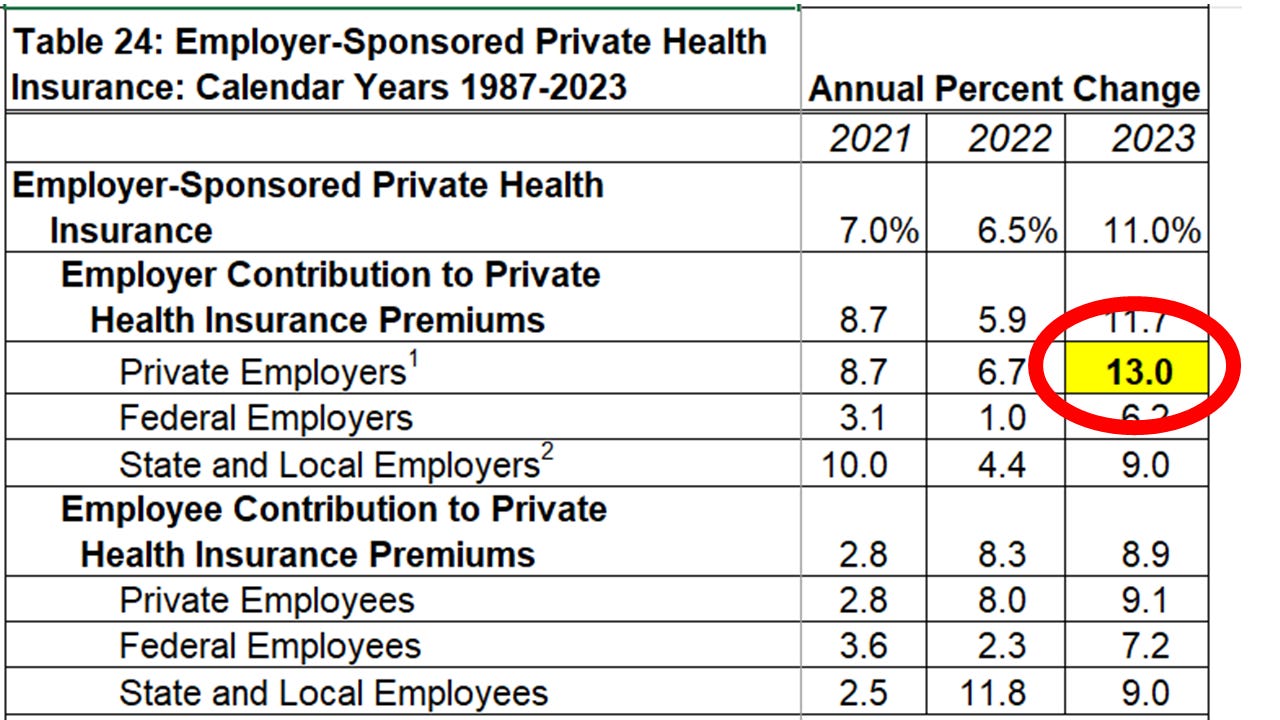Due to work on other projects, Healing and Stealing’s readers were spared any typical year-end punditry, but we want to take a moment and lay out one story we’ll dig into in 2025. Healing and Stealing could use your help answering a critical health care question: Are U.S. employers collectively out of their minds?
According to newly released national health expenditures data, private employers took the worst health care cost beating of any stakeholder in 2023, with expenditures for health insurance for workers growing by 13%, or more than 3 times the rate of consumer inflation.
Employers are bad at buying health care. No, seriously, really bad.
The majority of Americans are supposedly “covered” by health insurance obtained through a job. The cost of that insurance has grown at multiples of consumer inflation for a half century.
Yet the infinite pile of dollars employers shovel at health insurers and providers buys workers and their families less health care every year. Half of working age adults - the population for whom employers have the most direct responsibility - skip needed medical care every year, and millions of families are buried in medical debt.
As a class, employers and the people who own and run businesses are the most powerful group of people in the country. They’ve used their political muscle for decades to maintain control over health care financing, apparently so they can keep spending twice as much in combined taxes and premiums as their international competitors, while their workers get less health care and spend tens of millions of hours on the phone arguing with private bureaucrats every year.
All of which raises what should be an obvious question: why aren’t employers sprinting for the exits of the health care business? Healing and Stealing plans to focus a significant amount of energy on this question in 2025.
Scams and Hate Incoming: For the next few years, Washington DC and state capitals will be embroiled in battles over Medicaid cuts and Republican proposals to allow private insurers to sell even flimsier insurance than they already sell, so in 4 years J.D. Vance can make videos with a few voters who can say their premiums got cheaper.
These struggles will be accompanied by vicious, ill-informed attacks on immigrants, trans people and women’s health care, all of which began on Day One of the new Trump Administration.
Defending these programs and people is important. Healing and Stealing will have plenty to say on the subject. We’re proud that we produced the numbers to demolish the lie that undocumented immigrants are driving up health care costs. They actually subsidize everyone else. If you are fighting to protect undocumented people or to expand health care programs, please make sure everyone has the facts. The Texas Observer version of Generous Guests focuses solely on the question of undocumented immigrants’ health care taxes and spending. A detailed methodology for the estimates can be found in the Healing and Stealing edition, part of a broader analysis of then-candidate Donald Trump’s health care proposals.
Real Health Care Power Politics: Neither flimsy insurance, nor the politics of hate, nor defense of the status quo remotely approaches the threshold for meaningful improvement in the U.S. health care system. At the moment, the real politics of health care - the forces that can potentially shorten our 500-year slog to universal coverage - lie elsewhere, in relationships between businesses, patients, insurers, hospitals and medical practices, and in the continuing deterioration of the working conditions of the people who diagnose, heal and comfort us.
Of course we’ll dig up data to illuminate employers’ role as the dominant force in health care finance, but that’s not enough. Understanding why and how employers do what they do, whether as health care purchasers or political actors, requires conversation. Healing and Stealing has suspicions about why employers insist on continuing to maintain power over health care despite their evident failure as stewards, but suspicions aren’t reporting. So we need your help.
If you know someone who runs a business, has a leadership role in a company or is engaged in the purchase of health care for an employer who would be willing to talk to Healing and Stealing about their experiences, please connect us.
Purchasing health care is very difficult work. The fact that businesses have failed at it should not be surprising. People buying health care face several layers of monopoly power and an opaque end “product” that requires significant technical and scientific knowledge to evaluate. Companies that make, market, transport and sell everything from cars to flowers to legal services are also expected to have informed buyers’ opinions on the relative clinical value of surgery versus physical therapy or between various classes of drugs for thousands of conditions. We can learn a lot from the people who struggle with the task.
Like any journalist, I need some people to speak for the record. But understanding people’s work begins with background conversations. So if you know or encounter someone who is willing to share their experiences but might not want to be named, please let them know that I’d be excited to talk with them and use their information anonymously, or if necessary, keep the conversation totally off the record. “Off the record” means a conversation will improve my understanding of the flow of money through the system and the behavior of the players, but the specific content will never see the light of day. I’ve worked with and protected confidential sources whose livelihoods and, in a few cases, lives were at stake for more than 30 years.
The easiest way to get in touch is to email me at jcanhamclyne@gmail.com. If you do come across someone who might be willing to talk but is concerned enough about security that they feel an email is risky, just send me an email without any details, and I’ll respond with options for more secure communications. Thanks.




